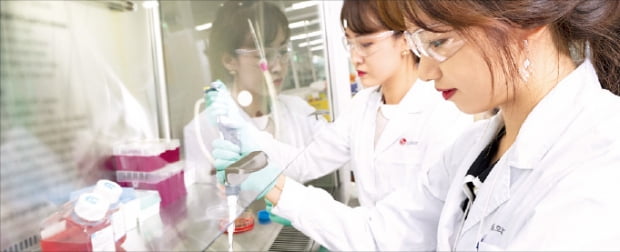
LG Chem recently bought new drug candidates for domestic bio companies. It is a different line from the open innovation (open innovation) strategy that has brought new drug candidates from overseas. It is analyzed that LG Chem is trying to regain its former position in leading the domestic pharmaceutical and bio industry by diversifying into metabolic diseases, immune diseases, and cancer, and expanding cooperation with domestic bio companies.
Secure cell/gene therapy technology
LG Chem announced on the 23rd that it has signed a technology transfer contract with Medipost for’MLSC’, a stem cell culture platform technology. MLSC is a mesenchymal stem cell culture technology owned by Medipost. The company explained that the application of this technology enables mass cultivation of mesenchymal stem cells with good activity, enabling the development of cell therapy products. LG Chem plans to develop cell therapy products that can accurately reach the treatment area by combining genetic manipulation technology and MLSC technology.
This contract is an extension of the joint research contract signed by the two companies in January last year. At that time, LG Chem decided to develop a candidate material for stem cell treatment derived from cord blood through research cooperation with Medipost for two years. With this contract, LG Chem has the right to develop and commercialize a global monopoly on new drug candidates secured through joint research. We did not disclose advance payments and incentives (milestones) for each stage according to the degree of clinical and commercialization.
On the 22nd, LG Chem also signed a technology transfer contract with a domestic bio company. ICM, a gene therapy company, bought the Korean and Chinese copyrights of’ICM-203′, which is being developed as an adenovirus vector-based degenerative arthritis treatment. ICM is a subsidiary of Yonsei University Technology Holdings, and is currently pursuing phase 1 clinical trials for ICM-203 in Australia and the US. LG Chem is planning to develop this gene therapy as a treatment for degenerative arthritis as well as other autoimmune diseases.

“2 global new drugs released within 10 years”
LG Chem has signed 10 license agreements over two years since November 2018. Metabolic diseases and cancer. The initial four contracts, which were held until March last year, were to acquire the rights to anticancer drugs and non-alcoholic steatohepatitis (NASH) treatments from bio companies such as the United States, United Kingdom, Belgium and Sweden. It also bought Asian rights for non-small cell lung cancer vaccines in phase 1 clinical trials in Europe.
There are four license agreements signed this year. Three of these were made with domestic companies. In April, LG Chem secured East Asian rights for’GEN-001′, which Genome & Company is developing as a microbiome anticancer drug. Overseas, in August, TransThera Biosciences, China, introduced the NASH treatment candidate’TT-01025′. The pipeline was approved by the US Food and Drug Administration (FDA) on the 2nd of the month for a Phase 1 Clinical Trial Plan (IND).
An official at LG Chem said, “We aim to release two or more new drugs in the global market by 2030.” It is a step to secure it.”
In October of last year, the company also brought the copyright of the botulinum toxin formulation in China from a domestic company, Pamari Search Bio. As soon as the results of ongoing phase 3 clinical trials in Korea are available, it is expected to conduct phase 3 clinical trials in China. LG Chem, which has the largest market share in the Chinese filler market, believes that it is possible to compete with Botox from Allergan in the United States by utilizing the existing distribution network in China.
Reporter Juhyun Lee [email protected]
Ⓒ Hankyung.com prohibits unauthorized reproduction and redistribution
